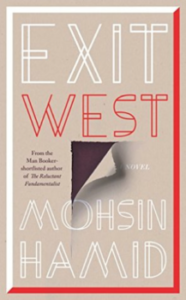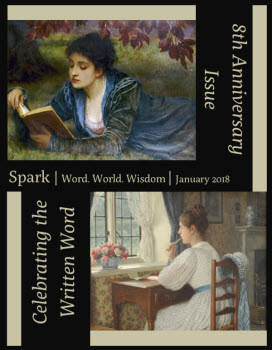by Ananya Sarkar
Exit West
Mohsin Hamid
Hamish Hamilton, 2017
ISBN 978-0-670-08988-8
Pages 229, Price Rs 599
Mohsin Hamid, the Man Booker-shortlisted author of The Reluctant Fundamentalist, presents to us the refugee crisis on a global scale in Exit West. Amid civil strife and the debris of war and crime, the novel weaves a love story that navigates the contemporary scenario.
The book is primarily about Saeed and Nadia, whose romance begins in an unnamed city swollen by refugees, which they eventually flee. While Saeed lives with his parents, Nadia’s life is more radical. She lives alone, rides a motorcycle and does not pray. However, she wears the black robe which is customary for women in her community, not out of compulsion but as a means to ward off lecherous men.As the author puts it, it was a time when people could still exercise the luxury of choice – something that disappears with the precipitation of crisis in the book.
The couple meet at an evening class on corporate identity and product branding. Saeed works in an ad agency and Nadia in an insurance company. As the relationship develops, the country plunges deeper into civil unrest with militants gradually taking over. We witness how the increasing violence becomes an ordinary part of life when Saeed and his parents, while observing the stars on their terrace, remain unperturbed at the sound of gunfire. When Saeed’s father sees a group of boys playing football and feels cheerful reminiscing about his own past, it takes him a few moments to realise that the “ball” was the severed head of a person. The situation ultimately reaches such a point where Saeed and Nadia consider ways to escape from their country.
Hamid deftly infuses magic realism in describing the outlets of migration: “Rumours had begun to circulate of doors that could take you elsewhere, often to places far away, well removed from the death trap of a country. Some people claimed to know people who knew people who had been through such doors. A normal door, they said, could become a special door, and it could happen without warning, to any door at all”. This fantastic detail precludes the arduous details of the process of migration. Instead, it gives the author the leverage to focus on how Saeed and Nadia cope in the different places where they flee – the Greek island of Mykonos, London and then San Francisco.
No place provides complete protection to migrants like the couple. Even when the locale is considered to be safer than their home countries, refugees are hounded by the fear of violence from nativist extremists whose creed of hatred surprisingly resonates with that of the militants back home. This makes Nadia wonder at one point whether moving had changed anything at all or if their predicament essentially remained the same. The author, however, also logically presents the nativists’ viewpoint when Saeed and Nadia calmly discuss how the citizens must feel threatened by the influx of several refugees. There are sympathizers though, as seen when many natives extend their help and support to the migrants.
The challenges of dislocation and the constant flux of movement ultimately begin to take a toll on the couple’s relationship. As the continuing crisis changes Saeed and Nadia into increasingly different persons, the distance between them starts to widen till it becomes an impenetrable wall.
From time to time, the narrative shuttles to various other places such as Japan and Australia to describe incidents that manifest the widespread terror and violence. In this sense, Exit West takes place on a global scale. It boldly flashes the light on lives sabotaged by acts of hatred.
Similar to Hamid’s earlier works of fiction, this story of strife and struggle is told in quiet, unsentimental prose. It helps to underline the gravity of the situation.
The characters here are deliberately thinly sketched so as to dwell on the refugee crisis in greater detail. The narrative is diffused, perhaps to give a sense of the fragmentation grappling human civilization.
Overall, the book is a good read but it tends to get a tad monotonous at times. Also, the storyline has less of action compared to a faithful presentation of the milieu of displacement. In this sense, it may disappoint certain readers.
Barring these points, Exit West is worth the time. The author gently and effectively makes us identify with the lead characters, even though our situation may be far removed from theirs. As he writes, “We are all migrants through time”.






